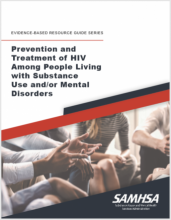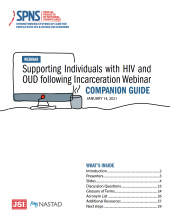
State health departments must dedicate staff and time to ensure a consistent approach to HIV and opioid use disorder (OUD) service delivery. For some states, this means creating new staff roles.



State health departments must dedicate staff and time to ensure a consistent approach to HIV and opioid use disorder (OUD) service delivery. For some states, this means creating new staff roles.
Data partnerships help coordinate HIV and opioid use disorder (OUD) services across state programs. These relationships can help state agencies identify service overlap and gaps, identify common goals, and initiate collaboration.
Language is foundational to how we understand and interact with ourselves and others. Unclear language can lead to confusion and inefficiencies, while stigmatizing and prejudicial language leads to harmful practices and dehumanizes people.
This document describes the critical role that peers have in developing and delivering care for people with HIV and OUD and how a state’s Medicaid program can serve as an essential fiscal resource in supporting peer services.
This webinar companion guide offers attendees a resource to supplement the information covered during a webinar and extend the webinar’s benefits beyond the allotted presentation time. It contains:
This webinar companion guide provides information for the January 2021 Strengthening Systems of Care: Supporting People with HIV and Opioid Use Disorder following Incarceration webinar.
This document contains slides for the September 2020 Models of Integrated Care for HIV and Opioid Use Disorder: Considerations for Community and Clinical Settings webinar.
This document contains slides for the July 2020 Building Support for Syringe Service Programs as Essential Services webinar.
This ready-to-use training package is designed to provide HIV clinicians (including physicians, dentists, nurses, therapists and social workers, and counselors, specialists, and case managers) with an overview of the opioid crisis and HIV.